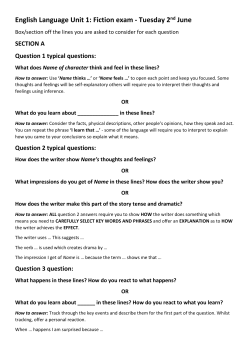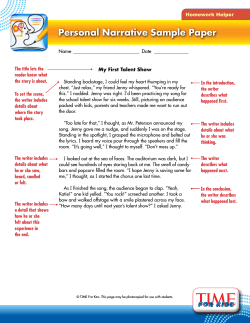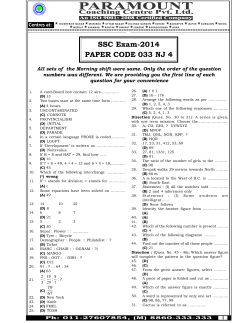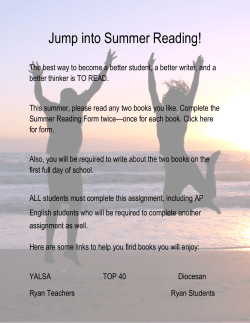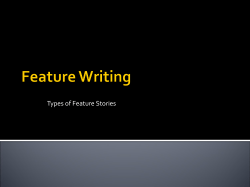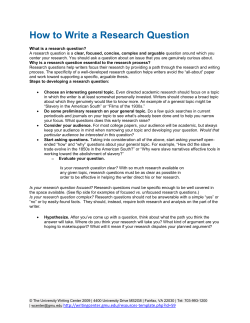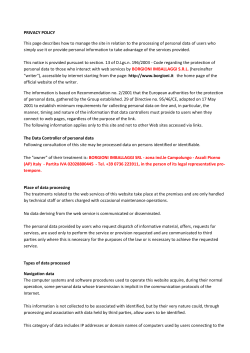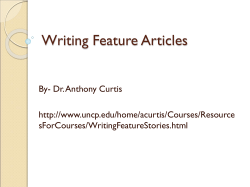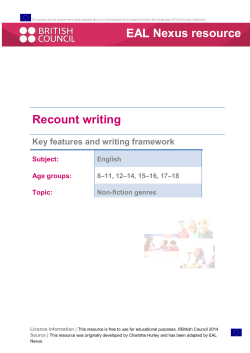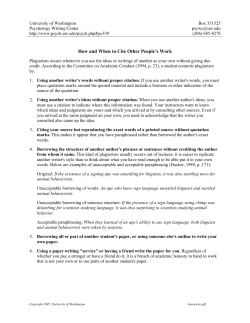
What do teacher need to know and do to develop writing?
What Do Teachers Need to KNOW and DO to Develop Writing? Judy M. Parr PhD 8th May 2014 Melbourne Writing: An Ongoing Concern Writing is #* hard! What Need to Know (++) • Knowledge of student writer • Knowledge of content (including processes) in writing • Knowledge of how best to support writing (pedagogy) • Knowledge of how to learn 5 Knowledge of the Writer Includes: • a student’s background, especially linguistic “capital” • a student’s current profile of “strengths and gaps” in writing (relative to expected quality performance) The Key to Knowing the Developing Writer • Gather evidence: –using a range of “sources” –in different contexts –as a normal part of teaching Purpose for Assessing Writing • Assess (FA, AtoL, AfL) to inform learning and teaching: – Interactive – Planned • Assess to make a judgment (whether met a standard or attained a level/ band) – A “test” or overall teacher judgment (OTJ) Know Your EvidenceGathering “Tools” (given purpose) • Understand strengths & limitations of tools – e.g. with writing “tests”, the question of validity, variability within a writer and agreement across raters • Referenced to curriculum (help examine effectiveness of teaching) or testing a more “general” ability to write? • Providing a judgment or diagnostic info.? • Allowing comparison of progress with what expected? Know About Progress and Pace • Understand the implications of a trajectory of progress (if pace is too slow, students will fall further behind) • Know what to notice that marks progress in writing Establish a Shared Understandings of Quality Performance • What does a quality piece of writing look like <at different levels; for different purposes>; what are the key features that are commonly associated with such quality writing? Date A Systematic Means to Diagnose Strengths and Gaps in Writing Criteria for assessing writing performance framed around purposes for writing persuade or argue instruct or lay out a procedure narrate-inform or entertain through imaginative narrative classify, organise, describe or report information explain recount (factual, personal) (PINDER) (and around dimensions of writing Dimensions of Writing • Rhetorical level – writer/reader/context: – Audience • Text level – Content/ ideas – Structure – Language resources • Conventions: – Grammar – Punctuation – Spelling Result: A Matrix Describing Features of Quality Writing • A “rubric” for each of the writing purposes; a series of descriptions that form criteria (for scoring)• by dimension of writing • and by curriculum level. Date asTTle Output: Writing Establishing Quality Through Collegial Discussion What Need to Know (++) • Knowledge of student writer • Knowledge of content (including processes) in writing • Knowledge of how best to support writing (pedagogy) • Knowledge of how to learn 18 “Content” Knowledge for Teaching Writing • Writing is complex requiring: – Knowledge of language (form, function and ‘discourses’); how writing “works” to achieve communicative purposes in different contexts – How to acquire & coordinate strategies for regulating the process Idea of Pedagogical Content Knowledge in Writing PCK involves knowing about writing from the point of view of teaching it to others (e.g. likely difficulties of students, developmental progression); knowing what form of “instructional force” will be effective Content Knowledge + Needed for Feedback to Writing • Read the student piece (Yr 5-6). It was to be a recount of some enjoyable event. • Provide one general comment or response. • Then, give two pieces of specific feedback that will best help the developing writer to enhance the piece. • (2-3 minutes) Date • Hi I am at home planning my trip to synedy and Brisbaned for Christmas and New years day I am going to stay in syned for a week and I am going to stay in Brisburnd for a week with my mum’s flat mate. When I go stay over in synedy I will meet rua his a dog of chris’s. Chris is one of marys flat mate now last time when I went there I had to count his money. There is bazz she’s another one of marys flat mate and nan she has 3 children one is around 14 years old the seoncod is 2 years old and the youngs child is nine mothes old. Then I go to Brisbured. I am going there on the 15th of December till the 5th of January 20001. When I got to synedy I am going to go to all this fantsey parks and wet and wild and I am going to stay in a hotal. Share with a Neighbour • General comment: It is likely to be positive and/or empathic • Does it introduce the idea of the need to ‘reorient’ the piece? • What specific feedback did you give? The Specific Feedback • Does feedback you gave indicate how well student is going? Does it give guidance on what a “good” recount should have? Does it relate to major features that would dramatically improve this recount? And does it say what exactly to do to improve? • Our research showed that the teacher’s score for quality feedback (based on these criteria) was strongly correlated to the amount of progress the class made in writing What Need to Know (++) • Knowledge of student writer • Knowledge of content (including processes) in writing • Knowledge of how best to support writing (pedagogy) (+ execute!) • Knowledge of how to learn 25 Knowledge of Pedagogy Teachers whose students make good progress in writing: • Combine ‘process-based’ classrooms with ‘deliberate acts of teaching’ (explicit instruction in writing) • Differentiate instruction (through ongoing monitoring, adjustment & revision) • Find authentic (and interesting/ exciting) writing opportunities Knowledge of Pedagogy Teachers whose students make good progress in writing: • Organise for productive talk and collaborative work • Make connections- between speaking and writing, reading and writing, across texts (and across subject areas), to real world experience • Help writers with processes and strategies involved in writing (integrated) Knowledge of Pedagogy • Share what students are learning about writing and why (higher level goals) • Make clear what quality performance looks like • Help each writer see what needs to do to achieve learning goal (give high quality feedback to students) • Work to create self-regulating writers Knowledge of How to Learn: Teachers as Learners • Inquire into own practice • Use evidence to work collectively to change or hone practice to improve student writing Effective Development of Writing is Multi-dimensional • Dimensions of powerful practice: knowledge of learner; of content and pedagogy, and of inquiry are intertwined/ interdependent Over To You! Questions? Comments? jm.parr@auckland.ac.nz Selected References • • • • • • PARR, J.M. ‘Classroom assessment in writing’ In J. McMillan (Ed). Sage Handbook of Research on Classroom Assessment. Thousand Oaks, CA: Sage. 2013. PARR, J.M. ‘Repertoires to scaffold teacher learning and practice in assessment of writing’. Assessing Writing, 16, 32-48, 2011. PARR, J.M., & TIMPERLEY, H. ‘Feedback to writing, assessment for teaching and learning and student progress’. Assessing Writing, 15, 68-85, 2010. PARR, J.M., & LIMBRICK, E. ‘Contextualising practice: Hallmarks of effective teachers of writing’. Teaching and Teacher Education, 26, 583-590, 2010. TIMPERLEY, H.S., & PARR, J.M. ‘What is this lesson about? Instructional processes and student understandings in the writing classroom’. Curriculum Journal, 20, 43-60, 2009. GLASSWELL, K., & PARR, J.M. ‘Teachable moments: Linking assessment and teaching in talk around writing’. Language Arts, 86, 352-361, 2009.
© Copyright 2025
